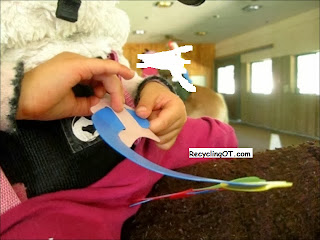What is Weaving?
Weaving is the process of interlacing threads by going over and under each other. Young children are often introduced to this concept by weaving paper place mats. This wonderful arts and crafts project teaches
- concepts of "under" and "over"
- manipulation skills
- sequencing
- cutting skills to prepare weaving strips
- to use the right amount of force to avoid ripping the paper!

Weaving with Plastic
Manipulating plastic to weave simple or more complex shapes teaches the same concepts but can be adapted to an individual's learning needs. Plastic won't rip and therefore minimizes frustration! I cut up plastic bottles using leather shears to create weaving projects such as the one below. It can be reused over and over again and is easy to clean.

How to Simplify Weaving
The most simple weaving frame has only 2 slits that are nice and large to make manipulation easier. Juice containers tend to be made out of a more flexible plastic than detergent bottles and is therefore, easier to cut and manipulate. The photo below shows my son holding a single weaving frame that I made over 20 years ago! I made them in different colors to match.


Adaptations to Promote Success
- Taking the pieces apart is easier than putting them together and some individuals with cognitive and/or motor challenges may only learn this step of the sequence.
- Use thicker, stiffer plastic if you want the person to use force. This makes the activity "resistive" and provides sensory stimulation to muscles and joints. Try using the vibrant, strong plastic from coffee containers, plus it smell great!
- Use more pliable plastic to make manipulation easier. Check out lids when purchasing coffee, nuts, raisins and other products.
- Consider seasonal themes such as the heart and arrow shown in the video.
The last video demonstrates how to cut a long, very long-strip of plastic to weave shapes onto. This is great for children or adults with developmental disabilities who enjoy repetitive fine-motor tasks. Color or shape sequencing is optional.
The client shown above is sitting on a horse. After some wonderful movement stimulation, we come to a stop and take apart Weavable Toys shapes. She is only 3 years old and its easier to take the shapes off and insert them into a container. I love rewarding hard work with a pony trot!


